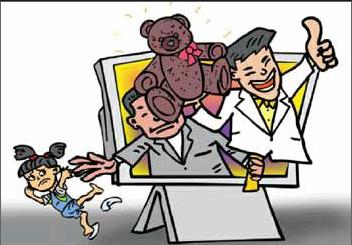Should We Use Child Endorsers?
2015-03-16

Chinas top legislature has recently deliberated an amendment to the Advertising Law that stipulates that minors under the age of 10 should not be advertising endorsers. According to the proposed amendment, companies that use children under this age as spokespersons in advertisements will be fined.
Supporters of this ban believe that this move means to protect minors by imposing restrictions on the age of endorsers. Moreover, they believe that it will help promote the effectiveness of advertisements and commercials, making them more believable, reasonable and accurate.
Opponents of the ban believe that commercial activities are a good opportunity for children to gain knowledge and develop their capabilities. Therefore, they should have the right to decide for themselves with the help of their guardians whether they want to be endorsers of a certain product.
Negative impact
Ye Qingcheng (Beijing Times): The worldfamous child movie star Shirley Temple started her filming career at 3 years old. She recalled in her autobiography that she spent more than 10 hours in film studios and often felt so sleepy that she dozed off in front of the screen. However, she never felt it was wrong and thought other children were also working as hard as she was. While it may seem that her childhood was terrible, maybe her hard work paid off in the end given her income.
Despite various bans on child actors and actresses, they are always popular with the public because of their cuteness. Childhood, however, is supposed to be a period of time when children play and learn, and even if they are talented in acting, their talent should not be overused. Otherwise, they may end up paying for this lost time when they grow up. In this sense, a ban on childrens commercial endorse- ments really aims to protect minors from being negatively impacted by commercial activities.
When a child has gained fame by acting in movies or in televised entertainment programs, he or she will be able to capitalize on his or her reputation. A short commercial on Tv can bring in a huge amount of money. Too much entertainment engagement may be more than a child can bear, psychologically and physically, but a hefty paycheck looks attractive to the childs family. In most cases, these child stars will be overly consumed just as Temple used to be.
The proposed endorsement ban does not totally forbid children to act in commercials. They are banned only from playing the lead role and speaking for a certain product in their own names. Striking a balance between happy childhood and the demands of being a child star is a delicate balancing act for parents and advertising agencies. We do hope that we can protect child stars growing years while the audience can still enjoy their excellent performances.
Bian Guanghun (Yanzhao Metropolis Daily): Generally speaking, children under the age of 10 possess only a simple understanding of social events. However, when they become advertising endorsers, they have to face events beyond their cognitive capacity. In most cases, they dont actually know how the products they speak for are used. They say and do what the businesses pay them to say and do. Therefore, its quite doubtful whether the products these child stars speak for are reliable or not.
Some companies using child endorsers intend to mislead these endorsers peers. The products may not be as good as are exaggerated in advertisements. These businesses hope their products will impress other children when they see child stars are using them. They will then ask their parents to buy this or that product for them.
Parents of child stars rarely see the negative impact caused by their childrens endorsements on society and on the children themselves. Becoming a movie star and product spokesperson at such an early age can seem glorious. The ability to bring in so much money at this age can seem even more so. This can lead to vanity growing in childrens hearts. When children under 10 are forbidden by law to act as advertising endorsers, the ban will do more good than harm.
He yonghai (www.scwmw.gov.cn): Nowadays, products endorsed by children can be seen everywhere. Companies are trying to sell more products by taking advantage of childrens cuteness. However, using children as endorsers may mislead other children. When the endorsing child shouts,“Mom, I want this,” this advertisement is persuading other children to ask their parents to buy the product for them.
Its also harmful to child endorsers who are required to imitate and exaggerate in commercials. These children might lose their character. Also, when they have already made big money, will the child stars be still interested in schoolwork? More importantly, if they happen to endorse a fake and bad- quality product, minors under the age of 10 are unable to take civil responsibilities. Actually, it is their parents that collect endorsement fees. We are therefore in need of legal regulations so that the parents cant exploit their children for advertising money.
A possible counterargument states that if minors under 10 are forbidden to be advertising endorsers, child products in the future will be endorsed only by adults. This is a misunderstanding. An advertising endorsement means that the endorser suggests a product to the public in his or her own name. In this sense, children can still play into advertisements without recommending a product in their own names. Even if the product is not as good as is advertised, they dont need to take responsibilities. Child stars who enjoy a lot of fame, in contrast, are supposed to take responsibilities for their endorsement activities. This type of situation is in the ban category.
Advertisements are broadcast because businesses want their products to be known by as many people as possible. In many countries, cartoon figures are used in milk powder advertisements. Therefore, we in China can also use cartoon figures instead of child stars. Maybe cartoon figures will be more attractive and successful than real people, even if they are famous child stars.
A matter of choice
ye Zhusheng (The Beijing News): Endorsing an advertisement does not necessarily violate minors rights and interests. Its thus improper to forbid all such commercial activities among children. The minors and their parents should be given the right to decide whether to do the job after fully analyzing the advantages and disadvantages of being an advertising endorser. Otherwise, instead of protecting minors interests, the law will restrict their freedom and rights.
Meanwhile, endorsements are usually conducted by celebrities. When it is stipulated by law that minors under the age of 10 should not be chosen as advertising endorsers, we dont know whether only well-known child stars are forbidden or ordinary children under this age are also in the category. Therefore, in the process of implementation, there might be some specific problems.
